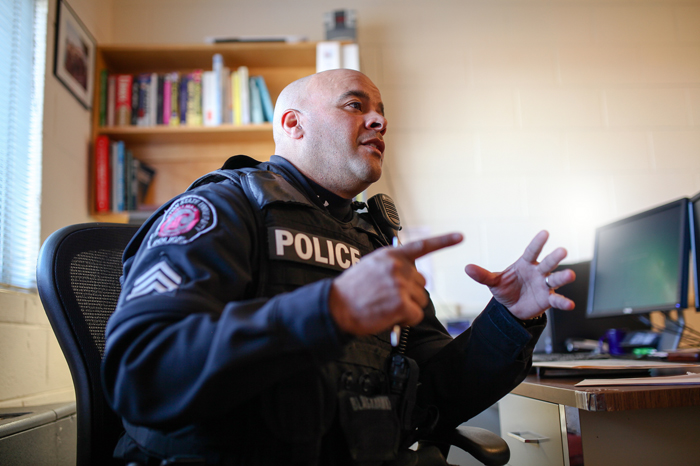Back in uniform
Police sergeant Bryan Jacobson of the WSU Police Department describes his experiences on duty in Afghanistan at the WSU Public Safety Building, Wednesday, Nov. 20, 2013.
January 17, 2014
Taking a road trip from Pullman to Minnesota, Bryan Jacobson drove with the goal of showing his son Derek the value of knowing his roots.
Jacobson, a WSU Police sergeant and Navy officer, knows the importance of understanding different cultures after serving four deployments in areas including Iraq, Bahrain, Kuwait, and Afghanistan. He hopes what he has learned will help him serve as a role model for his son.
“You look at things that you may not have had the opportunity when you were growing up, and you want that for them,” he said.
He joined the Navy after high school, started at WSU with ROTC in 1987, and took a position with WSU Police after completing his degree.
It wasn’t until just before Sept. 11, 2001, that Jacobson returned to the Navy.
“My wife (Syndi) is really great about it,” he said. “If it wasn’t for her support and independence I would never have been able to go back in.”
Syndi, who works in the WSU office of recruitment, said the first few months Jacobson comes home are always the toughest.
“Life cannot stop because he is not here,” she said. “I still have a son to raise and a job to do.”
With an independent personality, Syndi said she and Derek lead their own lives when Jacobson is gone.
However, she said keeping in touch through technology like FaceTime has increased her worry about her husband’s safety.
“There was one time I could hear in a different language they were saying something, and I said, ‘I’m not hanging up until you tell me what’s going on’,” she said. “They were being told to take cover.”
Jacobson said he remembers talking with Syndi while men fired guns in the background.
“Take your precautions, but you can’t worry about it,” he said. “You have to do your job.”
Friedrich Rochleder, a commander who served with Jacobson in Afghanistan, said they worked professionally together but would look to each other for advice when life did not go as planned.
“The thing I remember is I would always go into his office and grab a handful of jolly ranchers,” he said. “It’s hard to explain and communicate that kind of friendship you have.”
Rochleder said those types of relationships make or break a deployment.
When not working six days a week for 12 hours each day, Jacobson and his colleagues would play flag football games representing their alma maters. He and his commanding officer put together their own Apple Cup one year.
Of course, the Cougs won, Jacobson said.
During that most recent assignment, Jacobson said he worked with the Afghan police to teach them how to draft contracts for procurement. He said they worked on the national contract for $160,000,000 worth of veal, which was the first of that contract type the Afghans had ever done.
Jacobson also worked with contractors to help them understand the law and payment system with their government.
In Afghanistan, he said, contractors must submit a bill to the government within 90 days at the end of the fiscal year in order to receive their money. If they do not, the government is not required to pay. Also, if they refuse to work, contractors face jail time.
“Their people as a whole are uneducated, so I was trying to educate them and expose them to processes that we think are pretty common,” Jacobson said.
The people have about a 3 percent literacy rate, he said. Graduation from an Afghan high school is the requirement to serve on their police force.
Seeing the struggles the government and people face there, Jacobson said he appreciates the education system available in the United States.
“They would quote rules, and we would look it up. It wouldn’t even be close,” Jacobson said. “You don’t know if that person in the province can even read or write, or if someone just told them (the law).”
Well-educated people in the country often leave to seek opportunities in other countries, he said. Change will come, but it will take generations.
“They want a better country, they want to be self-sufficient,” he said. “They have the ability and the resources, but everybody there has to be willing to work at it.”
Returning in September 2013, Jacobson dug out his WSU police uniform and rejoined the officers who serve and protect the campus. He said he uses his experience in different cultures when working with the international students.
Syndi said in the next few years as Derek graduates from Pullman High School and Jacobson stays in the military reserve, she will appreciate having her husband home.
“We both are independent, and we make a pretty good team,” she said. “He cooks, I clean. It was an arrangement when we got married.”






















